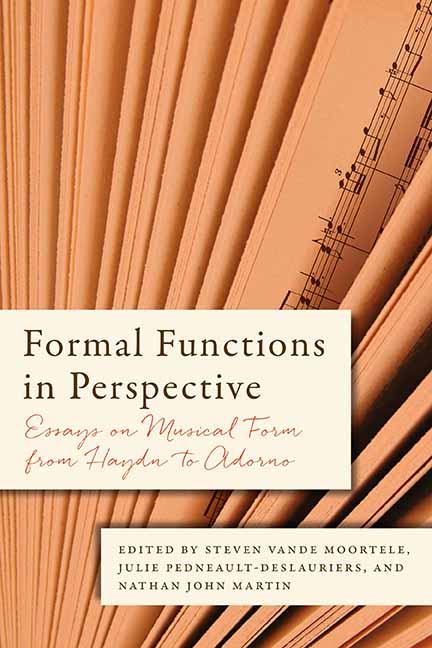Book contents
Afterword
Published online by Cambridge University Press: 26 May 2021
Summary
I am deeply honored to have been asked to contribute an afterword for this impressive volume, but the nature of my role remains elusive to me. Coming as it does after so many fine words on a remarkably diverse series of topics, the afterword—an “after-the-end,” to borrow William Caplin's expression—hardly needs to summarize the contents of individual chapters, already so succinctly accomplished in the editors’ introduction. Nor should it be my place to offer a review or critique of the collection; this will fall to future readers. Just the same, I cannot resist opening with admiration for the arduous work that our three editors and their contributors have undertaken in the development of this project, and for the outstanding outcome they have achieved.
I have been described by Steven Vande Moortele (“The Philosopher as Theorist,” p. 411) as Caplin's “principal interlocutor” in the early development of his treatise on Classical form, and so it seems fitting that I should elaborate on this generous compliment. We all have moments in our lives that remain unforgettable, down to the last detail, and one of them for me was the arrival of Bill Caplin as a new assistant professor of music theory in the School of Music at McGill University in the fall of 1978. I was waiting for him at the old reception desk in the Strathcona Music Building—excited to make his acquaintance, and relieved that, now three years into my first academic appointment, I would no longer be the sole full-time music theorist within the school. Though probably exhausted from his travels, Bill began almost immediately to talk about Carl Dahlhaus, having come directly from seminars with him in Berlin. Our conversations took off from there, and, in effect, they have never ended.
I had been hired at McGill largely on the basis of my Schenkerian and settheory credentials as a graduate student at Yale (remember!—that was in 1975), and I was still struggling to complete my dissertation, about Alban Berg's opera Wozzeck. Bill, for his part, was three years away from completing his University of Chicago dissertation, on “Theories of Harmonic-Metric Relationships from Rameau to Riemann”; and so he was as yet very much involved with historical studies on harmony and meter (his first article, “Der Akzent des Anfangs: Zur Theorie des musikalischen Taktes,” appeared in 1978).
- Type
- Chapter
- Information
- Formal Functions in PerspectiveEssays on Musical Form from Haydn to Adorno, pp. 434 - 440Publisher: Boydell & BrewerPrint publication year: 2015

